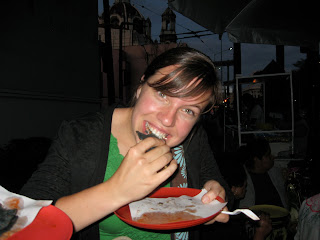If you didn't know already, I spent Sunday through Wednesday of this week at a conference in Mexico City. About two weeks ago, the Mexican consulate in Portland invited our clinic to partner with them as a Ventanilla de Salud, or "Health Station." Then then said, "Oh yeah, there's an informational meeting in Mexico City in a week, and we'll pay for someone from your office to go." Our van doc was the only person able to go, and she doesn't speak spanish well enough feel comfortable going alone. Therefore, I, the only other bilingual staff with a valid passport and open schedule, was chosen to go with her! Who'da thunk a non-profit would send their full time volunteer to Mexico??!?! I am one luck JV :)

Secretary of Health - Far Left
The conference was AMAZING! We spent Monday and Tuesday from 9-7 in a conference room in the Secretary of Foreign Affairs building with 60 other participants representing their consulate's Ventanilla, and about 15 government officials or employees of the Institute for Mexican's Abroad. The first day we had presentations from Mexico's Ambasador to the United States, and the Secratary of Health himself about the specific medical needs of the Mexican migrant population and the purpose of the Ventanillas de Salud as way for the Mexican government to care for their citizens abroad. 10% of the entire mexican population are migrants living in other countries. 12 million of those live in the US, 6.6 million of which are undocumented. Because the US federal government does not provide medical coverage for undocumented immigrants, (which the Secretary of Health said is a violation of the Universal Declaration of Human Rights - yikes!), the Mexican government is providing a way to keep its population healthy. Mexican migrants to the US leave a lifestyle where they eat fresh food, walk a lot, and have the support of friends and family, to go to a place where they eat cheap and bad food (or the US equivalent of what they had in Mexico which has a higher calorie and fat content), they are more sedentary and isolated and therefore have a much higher rate of diabetes, obesity, drug use, hypertension and depression than that of the Mexican and US populations.

Media for the Secretary of Health
Venanillas de Salud are partnerships of the Mexican Government (through the local consulate) with community organizations to provide heath information, education, and referral services to the Mexican migrant population. The "Fiscal Agency" receives money from the Mexican Government (not very much) to have a representative in the consulate, or have a "mobile consulate" that outreaches to rural agricultural communities, and offer these services. They want Ventanillas to offer information on pertinent health problems affecting migrant Mexicans, as well as information on insurance coverage options in the US and in Mexico. Mexico recently instituted "Seguro Público" - public insurance - that is free and covers all mexican citizens. So for an undocumented Mexican migrant in Oregon, for example, since they have no medical coverage options, they can sign up for this Seguro Público and go back to Mexico if they get really sick and be seen by a doctor within a week. Problem is once they go back to Mexico, how will they get back to the states? Hot topics these immigration and health care issues!

So Dr. Jimenez and I networked away for three days strait and discovered that there is no formula to being a Ventanilla. Each Ventanilla looks different and offers different services. The main purpose of the second day was to get feed back from current Ventanillas about standardization: what should be standardized? How? What requirements do they want? There is a lot of flexibility and other organizations were eager to help us develop our Ventanilla.


The Ancient Cathedral of The Virgin Guadalupe and the Modern Cathedral
These kind of opportunities really make me want to be a part of public health. It was encouraging for me to see Dr. Jimenez participate in these conversations. It was also interesting to see that a lot of the Ventanilla Coordinators were doctors trained in Latin America that can't practice in the US. I know that I would be unsatisfied simply doing policy and not being able to actually provide medical care, but I want to run a Ventanilla. When I asked Dr. Jimenez about mixing policy and practice, said she is happy doing what she's doing. She wants to do community health, but if that is what I want, I just need to be prepared for a major pay cut. I am so excited about the Ventanilla program and what it has to offer, so its sad that I probably won't ever see it come to fruition. But Sea Mar, where I'll be an americorps volunteer in Seattle next year, is the Ventanilla in Seattle. So there's hope!

It was a pretty amazing four days. So many of the opportunities I've had through Wallace are shaping what I believe as a person and what I want to do as a doctor. For that I am truly grateful.

sweet pictures erin! that sounds amazing!
ReplyDelete